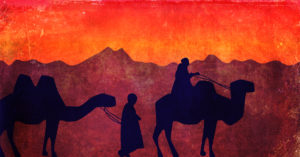Jewish World Watch has collected sermon excerpts from rabbis throughout Los Angeles in honor of National Refugee Shabbat. We also received a wonderful excerpt from a Bar Mitzvah speech.
“The Japanese Man Who Saved 6,000 Jews With His Handwriting”
by Rabbi David Wolpe
“Even a hunter cannot kill a bird that flies to him for refuge.” This Samurai maxim inspired one gifted and courageous man to save thousands of people in defiance of his government and at the cost of his career. On Friday I came to Nagoya at the invitation of the Japanese government to speak in honor of his memory.
The astonishing Chiune Sugihara raises again the questions: What shapes a moral hero? And how does someone choose to save people that others turn away?
Read the rest of Rabbi David Wolpe’s sermon here.
Rabbi Paul Kipnes
To be a Jew is to wonder where God is when bad things happen to good people, and, where God was when bad things happened to our people – like the Holocaust, and the Inquisition and the pogroms, and the recent death of Lisa, a 51 year old congregant, mother of 4 … and the Holocaust – Why did that Holocaust happen, God? 6 million of our people, murdered, 1.5 million of them children, and another 5 million others. Really? God, where were You? – and to wonder where God was when bad things happened to other people too, like the 1.5 million murdered in the Armenian genocide, and the almost 3 million in the Cambodian genocide, and the 1.2 million in the Rwandan genocide, and the many Sudanese Darfurans during the first genocide of this century, and that mom… who just died… too young… God, where are you?
Read the rest of Rabbi Paul Kipnes’ sermon here.
Excerpted from a sermon by Rabbi Neil Comess-Daniels
Rosh haShanah Morning 5779
Beth Shir Shalom, Santa Monica, CA
… Judaism is a way of responding to the mundane and the unexpected, always seeking the response that is at once the most just and the most merciful. We Jews have chosen our history to be our mandate. We choose to recall and emphasize our most ancient ancestor, Abraham, as a “wandering Aramean”, i.e., a refugee, an immigrant. We choose to remember and underscore that the quintessential experience of the Jewish people is both the slavery in and the exodus from ancient Egypt. We are all refugees …
“My father was a Syrian refugee/migrant.”
Excerpted from a writing by Rabbi Stan Levy
“Arami Oved Avi”
This passage from the Pesah Hagaddah and Deut. 26.5, awakens me to who I am and my ancestry. It is part of my life story and narrative.
And sets the framework for so many passages in the Torah: “We were refugees/migrants in Egypt.”
And why there are more Mitzvot protecting refugees/migrants living within our Biblical communities and settlements.
And for all of us Jews in America, we are not native to this land, our ancestors were refugees/migrants from Eastern Europe of the Mediterranean countries.
And so we have a special kin-ship with refugees/migrants in America today.
…
As Abraham stood up to God at Sodom: Shall not the Judge of the whole world do justly?
And Moses stood up to God in Sinai: Why are you letting your people suffer?
We must stand up to authoritarian laws and procedures which are unjust to refugees/migrants and cause them great suffering.
We must offer them sanctuary, just as every Christian should have offered us sanctuary from the Nazi authorities during the Holocaust, but only the righteous few did.
As Rabbi Abraham Joshua Heschel teaches us: “An act is unjust not because a law has been broken, but because a person has been hurt.
This is no time for neutrality!”
Excerpts from a Bar Mitzvah Speech
Benny Signer
Lech Lecha is the story of the start of the Jewish people. In this parasha, God tells Avram, or as we will come to know him, Abraham, to leave his home and go to the land that God will show to him. This land is, of course, Canaan, which we know today as Israel. God promises that if Avram goes, he will grow into a rich nation and his descendants will be as countless as the stars in the sky.
Read the rest of Benny’s Bar Mitzvah speech here.


